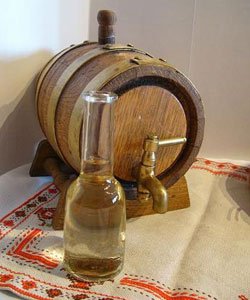

© Photo: Lyudmila Savova
In times of crisis a number of Bulgarians are concerned with prices and wonder which type of rakia is cheaper. The homemade, of course. Production of rakia at home is a part of the Bulgarian culture in a number of regions. The tradition is attractive to foreigners, too. Two years ago the retired English policeman Michael Weavers, who now lives in the Bulgarian village of General Toshevo won the local rakia competition. The locals now call him with respect Bai Michael.
It is known that monks from the monasteries near the town of Troyan in Central Bulgaria are masters of the plum rakia, which is prepared according to a recipe from the 19th century. At least 12 different types of herbs are used but special varieties include 33 herbs. In the monasteries the rakia is stored in oak casks. Before pouring the rakia into bottles, it is blessed in front of an icon of St. George.  Vassil Mandzhukov from the village of Oreshak told us more about the tradition of rakia production. “You should only drink rakia that has aged for 12 years,” he claims. “When we make rakia, we keep it in an oak cask for 6 months, before pouring into glass bottles and burying them in the ground,” he explains and adds: “Aged rakia has different qualities and that is why my father diet at 95.”
Vassil Mandzhukov from the village of Oreshak told us more about the tradition of rakia production. “You should only drink rakia that has aged for 12 years,” he claims. “When we make rakia, we keep it in an oak cask for 6 months, before pouring into glass bottles and burying them in the ground,” he explains and adds: “Aged rakia has different qualities and that is why my father diet at 95.”
English: Alexander Markov
The campaign for collecting plastic bottle caps, known as '’Caps for the Future’', continues to generate positive energy. For several years now, it has been demonstrating how a discarded product, such as plastic bottle caps, can become a symbol of the..
Dozens of popular Bulgarian athletes are to participate at the cycling event "Sofia Cycles for Cleaner Air". All of them will send a message for cleaner air and an even more beautiful and green capital. The event will kick off at 11:00 a.m. in..
Fun physics experiments from all branches of physics, demonstrations of methods for searching for new worlds in space, the necessary conditions to call a planet ''Earth's twin'', meeting with Bulgarian exoplanet hunters at the Astronomy Department -..
In response to a listener's question, in a series of publications Radio Bulgaria presents to its multilingual audience the types of documents giving the..
A little over 1,450 Leva is the sum needed per month by an individual living in a one-person household, and a total of 2,616 Leva for the monthly..
The traditional "Easter Workshop" will be held from April 23 to 26 in the Ethnographic Exposition of the Regional History Museum - Pazardzhik...

+359 2 9336 661
